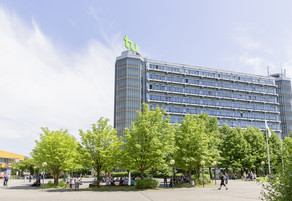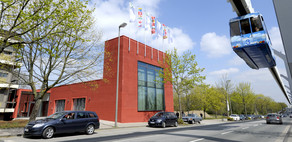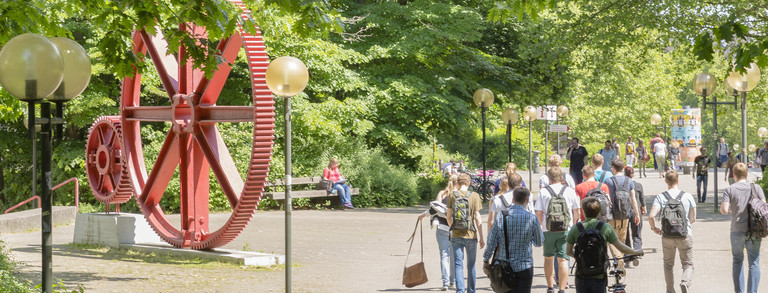Scholarship Programs and Study Financing
Are you studying at TU Dortmund University and need financial support? Here you can find general information on the topic of financing your studies as well as information on internal and external scholarship programs and other contact points on the topic of financing for refugees.
Support Program "NRWege ins Studium"
The Refugee Counseling and Integration Office of the International Office can award study scholarships for students of TU Dortmund University in need with a refugee background within the framework of the program NRWege ins Studium - Unterstützung von Studierenden mit Fluchterfahrung an Hochschulen in Nordrhein-Westfalen ab 2023, funded by the Ministry of Culture and Science (MKW) of the State of North Rhine-Westphalia.

The scholarships can be awarded to individuals who have no other means of adequately supporting themselves or financing their studies and who meet the eligibility requirements.
Depending on the applicant’s academic achievements and financial situation, the study scholarships are divided into full scholarships and performance scholarships.
Depending on income, full scholarships can be awarded up to €992 per month. If you receive BAföG, you cannot be awarded a full scholarship, only a performance scholarship.
The funding period is maximum twelve months.
A performance scholarship can be awarded for above-average academic performance, depending on income (including BAföG). The maximum funding amount is €300 per month.
The funding period is maximum twelve months.
Eligibility Requirements
Study scholarships may be awarded to students with a refugee background who meet the following requirements:
- Enrollment in a regular degree program at TU Dortmund University: A current certificate of enrollment must be submitted.
- A refugee background must be present: A currently valid residence document (front and back) proving a refugee background or a decision from the BAMF must be submitted.
- Entry into Germany within the last five years. *Exceptions possible if individuals have already received support within the programs NRWege ins Studium or Integra (scholarship, language course or consultation) or for the following reasons: Raising children, caring for care-dependent relatives, personal illness. Please contact us if this applies to you.
- Acquisition of a university entrance qualification abroad: The documents representing the university entrance qualification (e.g. foreign school or university degree) must be submitted.
- Financial need: Written confirmation that the studies cannot be financed (sufficiently) in any other way (in the application form).
- BAföG receipt: Proof must be provided that BAföG has been applied for and that the application has been rejected or not yet approved. If BAföG is received, the current BAföG notification must be submitted. The university must be informed of any changes immediately.
- Letter of Motivation: Submission of a letter of motivation outlining an interest in studying and the need for support.
- Academic achievements that indicate a successful course of study: Proof of academic achievements (current transcript of records) must be submitted.
- Positive evaluation ("Gutachten") by a university teacher from TU Dortmund University, in the case of an application from the 4th study semester or when applying for a follow-up scholarship*.
- Willingness to contribute to the program on a voluntary basis when applying for a follow-up scholarship*.
- Willingness to provide necessary personal data to the university as part of the funding and willingness to participate in surveys/studies.
- Willingness to make use of counseling services on a regular basis.
- Proof/letter of reference of voluntary work, if applicable.
- The completed and signed application form for study scholarships as well as all supporting documents must be submitted within the application deadline.
If you are awarded a scholarship, you must provide proof of your academic achievements during the scholarship period no later than two months after completing the scholarship.
In the event of becoming a naturalized citizen or being granted a so-called settlement permit ("Niederlassungserlaubnis"), the entitlement to the scholarship no longer applies. No follow-up application can be submitted. The scholarship can be granted until the end of the current funding phase.
*Follow-up scholarship = Renewed funding after previously receiving this scholarship.
You can find the application form required for the application here.
The complete application must be submitted by 23 February 2025, according to the information on the application form.
The complete documents can either be sent by post or dropped in the deadline mailbox of the International Office in front of the building. The address can be found on page 1 of the application form.
The selection of the scholarship holders is made by a commission and is based on various criteria, such as income and academic performance. Further information on the selection process can be found in the application form.
The selection will take place in March 2025. The scholarship holders will be informed in writing about the result of the selection process. The first scholarship installment will be paid in April 2025.
If you have any further questions, please contact the Refugee Counseling and Integration Office.






Study financing for refugees
When applying for a degree program you should already think about ways of financing your studies. After the enrollment, you will not receive any further financial support for your subsistence from the Jobcenter or the Federal Job Agency.
Although there are currently no tuition fees in North Rhine-Westphalia, studying is not free of charge. Every semester students have to pay a "social contribution” (i.e. a semester fee), which is used for the semester ticket, but also for student self-administration and other services. More detailed information on the social contribution can be found on the website of the Student Registration Office.
Furthermore, of course, there are also costs for your living expenses (rent, insurance, food, etc.). We have compiled an overview of funding opportunities for students with a refugee background during their studies. Please refer to the websites of the individual providers and sponsors for information on possible application deadlines and the according requirements for the funding.
Students with a refugee background may also be entitled to BAföG funding under certain circumstances. What is important here is either a permanent right of residence or a residence permit with prospects of permanent residence.
Refugees who are only tolerated ("Duldung") must have been in Germany legally, with permission or tolerated for an uninterrupted period of 15 months before they are entitled to BAföG.
Refugees must repay the loan portion of BAföG even if they later return to their home country. You can find this and more information here (DE).
If you have any questions regarding BAföG, please contact the BAföG Office of the Dortmund Student Services (DE) directly. There you can find out whether you are eligible for BAföG.
Bread for the World is the globally active development and relief agency of the Protestant Churches in Germany. It supports refugees who wish to continue or take up a professional academic training in Germany and who are not entitled to BAföG or other support measures.
Applicants may not be older than 35 years of age, must choose a development-relevant orientation for their academic training and present a residence permit. In addition, they must have been known to the respective Protestant student community for at least three months and ideally have already committed themselves to it. Funding is available for both the degree program itself and, in some cases, preparatory measures such as language courses. Participation in events of the accompanying study program and commitment to development policy are obligatory for scholarship holders.
The scholarship “Welcome” offered by Deutsche Universitätsstiftung (DUS) is targeted at undergraduate students with a refugee background who live in Germany. The scholarship includes finding a local and experienced mentor for the student, seminars designed to develop key competences, the opportunity to participate in academic events, and a yearly funding of 600 EUR for study-related academic books. Applicants must be enrolled as undergraduate students at a German university, need to provide proof of an adequate German language proficiency of at least level C1 (Common European Framework of Reference, CEFR) and have a refugee background.
The "hochform" program of the Deutsche Universitätsstiftung (DUS) supports master's students in STEM fields with the above-mentioned benefits.
The Friedrich Ebert Foundation (FES) offers its scholars material funding, a versatile educational program as well as individual counseling and support. Applications are open for undergraduate, graduate and Ph.D. students. Those refugees are eligible for this scholarship, who either have an established residence status (a stay in Germany longer than 15 months) and / or can claim BAföG. German language proficiency must be at least at B1/B2 level (CEFR) and applicants must either have a confirmation of admission or a certificate of enrollment at a state or state-recognized German university or university of applied sciences, or must be able to provide proof of study achievements from their previous studies in Germany or abroad.
The Heinrich Böll Foundation grants scholarships to approximately 1,200 undergraduates, graduates, and doctoral students of all subjects and nationalities per year, who are, aside from their academic achievements, characterized by their social and political involvement. In doing so, they need to display an active interest in the basic values of the foundation: ecology and sustainability, democracy and human rights, self-determination and justice. The foundation offers both financial support and a comprehensive range of events. All refugees who wish to start or continue their studies in Germany are welcome to apply. Application procedures are carried out twice a year.
The Konrad Adenauer Foundation supports undergraduate (Bachelor’s), graduate (Master’s) and postgraduate (Ph.D.) students. The scholarship is designed to help the recipients to prepare for their future careers in the public and the private sector, especially in academia, state institutions and international organizations, civic society, media or in the cultural sector. Benefits provided by the foundation include monthly financial support, a wide range of seminars, and career counselling. Applicants have to be either recognized refugees (i.e. as entitled to asylum, having been granted refugee status or subsidiary protection) or “tolerated” refugees or a holder of a specific humanitarian residence permit (the latter are only eligible for the program within the first 15 months after the asylum application in Germany).
The scholarship provided by the Otto Benecke Foundation (Otto Benecke Stiftung, OBS) addresses acknowledged refugees, late re-settlers as well as their relatives, and Jewish immigrants who seek to acquire a Higher Education Entrance Qualification (HZB) and wish to pursue an academic career. The program is funded by the Federal Ministry for Family Affairs, Senior Citizens, Women and Youth and requires a consultation with the local educational advisory service Garantiefonds Hochschule before acceptance into the program. The scholarship includes financial assistance for participation in language courses, special courses, preparatory courses and academic internships. In addition to the support program, the Otto Benecke Foundation also offers seminars to prepare students for their studies, as well as coaching for immigrant students directly at the universities. Applications for support from the foundation must be submitted before the age of 30 and within two years after arrival in Germany.
Since 1992, the Albert Einstein German Academic Refugee Initiative (DAFI) has offered scholarships to support numerous refugees who wish to begin or continue their studies. DAFI not only supports studies, but is also actively involved in the reconstruction of crisis-ridden countries. DAFI is funded by the Federal Government of Germany. In principle, it is only aimed at Bachelor students, but in special cases exceptions can be made by arrangement.
The German Academic Exchange Service (DAAD) administers the scholarship programme “Hilde Domin Programme” with funds from the Federal Foreign Office (AA). The programme serves to support students and doctoral candidates from across the globe, who are at risk of being formally or de facto denied educational or other rights in their country of origin, and to provide these students and doctoral candidates with an opportunity to begin or complete a study or research degree at a higher education institution in Germany.
Contact: Famke Lang
The DAAD scholarship database bundles information on DAAD funding opportunities for foreign students, graduates, doctoral candidates and university lecturers as well as offers from other selected funding organizations. Here you can search for suitable funding opportunities / scholarships using various filters.
More information on student financing and relevant funding opportunities at TU Dortmund University can also be found on the respective website of the International Office.
This overview of funding opportunities does not claim to be exhaustive.

![Eat & Read [Translate to English:]](/storages/international/r/Bilder/Veranstaltungen/Eat___Read/waffel_plain_buecherturm.jpg)









